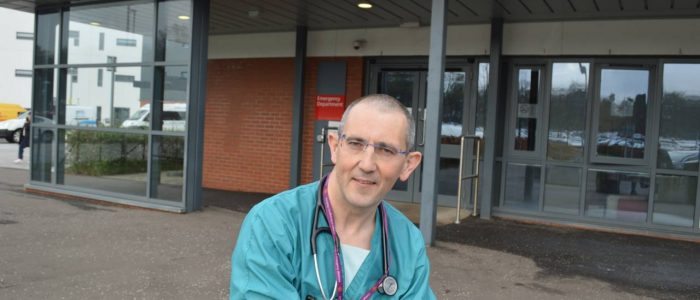Scots Medic to Join Ebola Mission
An NHS Forth Valley consultant in emergency medicine is setting off for Sierra Leone as part of the UK’s efforts to tackle the Ebola outbreak. Dr Roger Alcock, who works at Forth Valley Royal Hospital in Larbert, will join other medics who have volunteered to assist in Britain’s £125 million aid package to help combat the deadly virus.
The outbreak has killed nearly 5,000 people in West Africa with Liberia, Guinea and Sierra Leone the three worst-affected countries.
Dr Alcock will join staff at the Ebola treatment centre based in Port Loko. He explained why he had decided to volunteer. “This is a medical humanitarian crisis and urgent medical help is required. It is important that we control and contain the virus to prevent its spread out-with West Africa. I have the training and experience to be able to go to Sierra Leone and have received tremendous support from colleagues, friends and family.”
Scottish Health Secretary Alex Neil added: “It is always inspiring to see health professionals volunteering to go abroad to help tackle medical emergencies. The Ebola outbreak has had a devastating impact on some of the world’s poorest communities, and the courage and dedication of people like Dr Roger Alcock is playing a key role in the effort to bring the disease under control.
“More than 50 health workers from Scotland have already volunteered to go to West Africa to help with the response. I have personally written to NHS chief executives to reiterate our full support for these volunteers. I would like to extend my sincere thanks to all Scottish aid workers, health workers and other support staff who are doing their bit to help the people of Sierra Leone, Guinea and Liberia.”
No stranger to working overseas, Dr Alcock was chief medic with Raleigh International in Namibia and has worked as an Expedition Doctor for Across the Divide expeditions in Cuba, Peru, China, Nepal, Tanzania and throughout the UK and Europe including Arctic Norway. He has previously been in Malawi as part of a project funded by the Scottish Government to develop and support emergency medicine in an emergency department in Blantyre. Earlier this year he worked in Kurdistan delivering medical training and simulation in conjunction with the UN and the World Health Organisation.
Before deployment Dr Alcock will complete nine days of intensive training with the British military and UK-Med followed by further specific Ebola training in Sierra Leone. He said: “I wouldn’t be human if I didn’t have concerns because Ebola is a serious disease. However I will be having world class Ebola-specific training and will deploy as part of a well-resourced and experienced British military and civilian partnership team.”
Outlining the need to help in Sierra Leone, Dr Alcock said that before the Ebola outbreak, there were 136 doctors for a population of six million, together with 1017 nurses and midwives and 114 pharmacists. This would be the equivalent of Scotland having 120 doctors, 900 nurses and 100 pharmacists.
His latest role overseas includes three weeks of holiday time and he is scheduled to return to Scotland at the end of December 2014. He plans to return to work after a break and satisfactory health screening by specialists in tropical medicine in Liverpool. During his time away NHS Forth Valley has put in place appropriate cover arrangements within the Emergency Department, funded by the Department for International Development.





